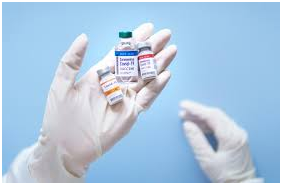Plenty of shots but few takers in India
India successfully rolled out the massive coronavirus vaccination drive on January 16, where 2 vaccines, Covishield and Covaxin are being administered to frontline health workers across the country. While most of the world is struggling to secure enough vaccines to inoculate their populations, India has plenty of shots but a shortage of people willing to take them.

Due to safety concerns over a vaccine that has yet to complete phase III trials, some health-care and other frontline workers are hesitating to get vaccinated. As of Monday, only about 56% of people eligible to get the shot have stepped forward.
Vinod Kumar, a resident doctor at the All India Institute of Medical Sciences of Patna, said, “At least 40% of doctors here are unsure and want to wait. Carrying out a vaccine trial on us when India is short of doctors, health-care workers doesn’t make sense.”
While vaccine hesitancy has surfaced in places like Japan and Brazil, and China’s candidates have also faced questions over data, the scale of the problem in India is by far the biggest. The major difficulties facing places like the U.S. and Europe are mostly due to scarce supplies rather than vaccine acceptance, and some countries are turning to New Delhi for help: India says it can produce 500 million shots per month for export, and countries such as the U.K., Belgium and Saudi Arabia have sought to buy them.
India’s domestic vaccine program administers one of two shots: Covaxin and Covishield. India’s approval of the Bharat Biotech shot, which was developed with government-backed research groups, was met with widespread criticism from scientists because of the lack of complete data.
“Many in our institute aren’t comfortable with Covaxin because we don’t know how effective it is. To build trust among people the government must come out with the data, evidence of the trials, and encourage free and fair discussions,” said Adarsh Pratap Singh, a member of the Resident Doctors Association at the All India Institute of Medical Sciences in New Delhi.
Krishna Ella, Bharat Biotech’s chairman, said earlier this month that the company carried out “200% honest clinical trials” and had a track record of producing 16 safe and effective vaccines. “Indian scientists want to bash on other Indian scientists,” he said while dismissing criticisms in a virtual press briefing on Jan. 4. A spokesperson for Bharat Biotech didn’t immediately respond to a request for comment.
Meanwhile, the government has urged health-care workers to get vaccinated. Health Minister Harsh Vardhan has sent tweets imploring “#CoronaWarriors” to take the shot, while dispelling rumors that the vaccine could cause infertility.
“Vaccine hesitancy among health workers should end. I am pleading on behalf of the government, that please adopt it, because no one knows how this pandemic will take shape in the future,” said V. K. Paul, a member of the planning body Niti Aayog, noting that he’s taken the Covaxin shot without any adverse effects.
“These two vaccines are safe,” he said. “We have a system to track it and if there is an unusual signal, it will be responded to the way it should be.”
Initial apprehension and doubt at the start of any vaccine rollout is normal, said Preeti Sudan, former secretary at the federal ministry of health and family welfare.
As of Monday, India distributed about 2 million shots nationwide. In Madhya Pradesh, the largest state in central India, about 75% of enrolled people turned up for vaccination on Jan. 21, while two days later in Bihar the rate was much lower at 51.6%. On Jan. 19, about 55% of those eligible were vaccinated in Rajasthan and 54% in the southern state of Tamil Nadu, according to state government data.
While the hesitation relates to both vaccines, people are most wary about Bharat Biotech’s Covaxin. In Tamil Nadu, for example, only 23.5% of those allocated Covaxin received the shots on Jan. 19, compared with 56% for the Serum Institute’s Covishield, the data show.
